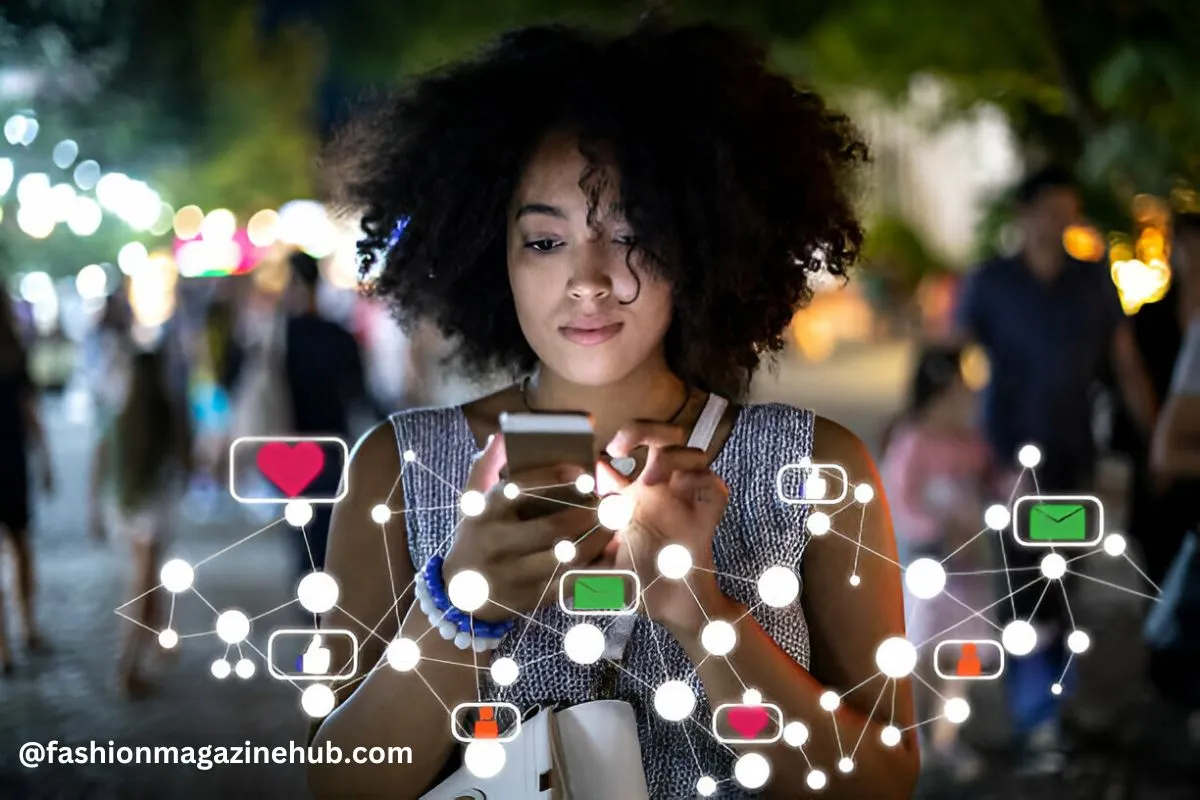No Longer Identify on Social Media: A Growing Trend In Online Privacy
In today’s interconnected world, social media has become a ubiquitous part of daily life, offering platforms for communication, networking, and self-expression. However, alongside its benefits, many individuals are increasingly choosing to no longer identify on social media. This decision stems from various factors, including concerns over privacy, the impact on mental health, and the desire to reclaim time from digital distractions. As people navigate the complexities of online presence, the concept of no longer identifying on social media raises important questions about personal identity, digital footprint management, and the balance between virtual interactions and real-world connections. Understanding the motivations behind this choice and exploring the tools available to facilitate it can empower individuals to curate their online presence intentionally.
The Negative Effects of Social Media on Personal Identity
In recent years, the decision to no longer identify on social media has become increasingly common as individuals recognize the negative effects of these platforms on personal identity. Comparing past and present use of social media reveals significant changes in how we interact with these technologies. Initially, social media was a tool for staying connected with friends and family. However, its role has evolved into a more complex and pervasive influence on daily life. This shift has led to a loss of privacy and control over personal information, as users often share intimate details online. Furthermore, the pressure to conform to societal standards on social media can be overwhelming, leading individuals to curate idealized versions of themselves. This constant comparison and validation seeking can negatively impact self-esteem and self-worth, prompting some to step back and choose to no longer identify on social media.
Comparison of Past and Present Use of Social Media
In the early days of social media, platforms like MySpace and Facebook were primarily used to keep in touch with friends and family, share photos, and post updates about daily life. These interactions were often limited to a close-knit group of connections. Over time, the use of social media has evolved dramatically. Today, platforms such as Instagram, Twitter, and TikTok have transformed into spaces where users not only connect with others but also build personal brands, follow influencers, and consume a constant stream of content. The shift from private interactions to public personas has changed the way people present themselves online. This evolution has brought about increased engagement and connectivity but also heightened scrutiny and pressure to maintain a certain image, leading to more significant implications for personal privacy and mental health.
The loss of Privacy and Control Over Personal Information Is a Aignificant Issue
The pervasive nature of social media has led to a significant loss of privacy and control over personal information. Users often share personal details, locations, and daily activities without fully understanding the potential consequences. This information can be easily accessed, misused, or sold by third parties for targeted advertising or more malicious purposes. Moreover, social media platforms frequently update their privacy policies, sometimes in ways that users are unaware of, further eroding control over personal data. The result is a digital footprint that is difficult to erase, leaving individuals vulnerable to identity theft, cyberstalking, and other forms of online exploitation. The realization of these risks prompts many to reconsider their social media presence and take steps to protect their privacy by limiting the information they share or by opting to no longer identify on social media.
Pressure To Conform To Societal Standards
Social media has created an environment where users feel a constant pressure to conform to societal standards of beauty, success, and lifestyle. Platforms like Instagram and TikTok, which are heavily visual, emphasize curated and often unrealistic portrayals of life. Influencers and celebrities set trends and expectations that can be difficult for the average person to meet. This pressure can lead to behaviors such as editing photos, seeking validation through likes and comments, and even developing a dependence on social approval. The need to conform can drive people to present a version of themselves that is not genuine, causing stress and anxiety. Over time, this can result in a disconnect between their online persona and real identity, prompting some to step back from social media to reclaim their authenticity and well-being.
Impact on self-Esteem and Self-Worth
The impact of social media on self-esteem and self-worth is profound. Users often compare their own lives to the highlight reels of others, forgetting that what they see online is not always a true reflection of reality. This comparison can create a sense of failure or unworthiness, particularly among young people who are more susceptible to external influences. Additionally, the feedback loop of likes, comments, and shares can make self-worth contingent on social media engagement. Negative interactions, such as cyberbullying or critical comments, can further damage one’s self-esteem. Recognizing these detrimental effects, many individuals choose to no longer identify on social media, seeking to protect their mental health and build self-worth independent of online validation.
The Dangers of Oversharing on Social Media
The choice to no longer identify on social media is often driven by the dangers of oversharing. Social media platforms encourage users to share various aspects of their lives, but this can lead to unintended consequences. Examples of oversharing include posting personal milestones, daily routines, or intimate details that may seem harmless but can be exploited. The consequences of oversharing are far-reaching, from identity theft to online harassment. Moreover, oversharing can significantly affect personal identity, as individuals may feel pressured to maintain a certain online persona, leading to a disconnect between their real and virtual selves. Setting boundaries on social media is crucial to protect one’s identity and mental health. By limiting the amount of personal information shared online, individuals can reclaim control over their narratives and avoid the pitfalls of excessive disclosure.
Examples of Oversharing on Social Media
Oversharing on social media can take many forms, ranging from posting intimate details about personal relationships to sharing sensitive information about one’s daily routine. Examples include posting frequent updates about one’s emotional state, disclosing private conversations, and sharing real-time location data. Additionally, some users might post an excessive number of photos or videos that reveal too much about their home, family, or lifestyle. Another common form of oversharing is discussing work-related issues or conflicts, which can lead to professional repercussions. These behaviors not only expose individuals to potential risks but also create a digital footprint that can be difficult to manage or erase.
Consequences of Oversharing
The consequences of oversharing on social media can be significant and far-reaching. One primary risk is the potential for identity theft, as personal information can be exploited by malicious actors. Professionally, sharing too much about workplace issues or personal opinions can damage reputations and career prospects. On a social level, oversharing can strain relationships, as friends or family members might feel uncomfortable or betrayed by the public disclosure of private matters. Furthermore, the information shared online can be permanently accessible, leading to long-term privacy concerns and the potential for regret over past posts.
How Oversharing Can Affect Personal Identity
Oversharing can significantly affect personal identity by blurring the lines between public and private life. When individuals share too much online, they often curate their lives to fit perceived expectations or trends, leading to a distorted self-image. This constant need for validation and approval from online interactions can erode genuine self-confidence and lead to an identity that is heavily influenced by external perceptions rather than internal values. The pressure to maintain a particular persona can result in a disconnection from one’s true self, causing stress and anxiety. Over time, the disparity between the online persona and real-life identity can create feelings of confusion and dissatisfaction, prompting some to reconsider their social media habits.
Importance of Setting Boundaries on Social Media
Setting boundaries on social media is crucial for maintaining privacy, mental health, and personal identity. By establishing clear limits on what to share and with whom, individuals can protect themselves from the risks associated with oversharing. Boundaries help manage the amount of personal information available online, reducing the likelihood of identity theft, cyberbullying, and professional repercussions. They also provide a framework for maintaining a healthy relationship with social media, preventing it from consuming too much time and energy. Additionally, setting boundaries encourages more mindful and intentional use of social platforms, allowing individuals to focus on genuine connections and real-life experiences. Ultimately, boundaries support a balanced and secure online presence, fostering a healthier self-identity.
The Illusion of Connection on Social Media
Another reason people may choose to no longer identify on social media is the illusion of connection these platforms create. Social media often fosters superficial relationships that lack depth and genuine communication. While it may seem like we are more connected than ever, the interactions on social media are often brief and impersonal. This lack of genuine connection can impact social skills and real-life relationships, as individuals may become more accustomed to online interactions than face-to-face communication. As a result, personal identity and sense of belonging can be compromised. The convenience of social media can sometimes overshadow the value of authentic relationships, leading individuals to reassess their online presence. Choosing to no longer identify on social media can help people focus on building meaningful connections that enrich their lives.
Superficial Relationships on Social Media
Social media often fosters superficial relationships that lack depth and genuine emotional connection. Many online interactions are characterized by brief, surface-level engagements, such as liking a post or leaving a short comment, rather than meaningful conversations. These interactions can create the illusion of closeness and social connectivity, but they often do not translate to real-life relationships. The transient nature of online friendships can lead to a revolving door of connections that are easily formed and just as easily forgotten. This superficiality can be particularly evident in relationships with influencers or celebrities, where interactions are one-sided and primarily focused on consumption rather than genuine dialogue. Over time, these shallow connections can leave individuals feeling isolated and disconnected despite having numerous online “friends.”
Lack of Genuine Communication and Connection
The nature of communication on social media often lacks the authenticity and depth found in face-to-face interactions. Online, people tend to present curated versions of themselves, highlighting their best moments and concealing their struggles. This can create a distorted view of reality, making it difficult to form genuine connections. The asynchronous nature of online communication also contributes to this issue, as it lacks the immediate feedback and emotional nuances present in real-time conversations. Emojis and text cannot fully convey the subtleties of tone and body language, leading to misunderstandings and superficial interactions. As a result, meaningful, deep connections are harder to achieve, and users may feel a sense of emptiness or dissatisfaction with their online social life.
Impact on Social Skills and Real-Life Relationships
Heavy reliance on social media can negatively impact social skills and real-life relationships. Constant engagement with online platforms can reduce opportunities for face-to-face interactions, leading to a decline in conversational abilities and empathy. People may become accustomed to the convenience and safety of digital communication, avoiding the challenges and complexities of in-person interactions. This can result in awkwardness or anxiety in social situations, making it harder to build and maintain meaningful relationships. Additionally, the instant gratification of online validation can reduce patience and perseverance in real-life relationships, where trust and connection require time and effort to develop. The erosion of social skills can further isolate individuals, creating a cycle that reinforces dependence on superficial online interactions.
How This Affects Personal Identity and Sense of Belonging
The reliance on superficial social media interactions can profoundly affect personal identity and sense of belonging. When individuals prioritize online validation over real-world connections, their self-worth may become tied to the number of likes, comments, and followers they receive. This can lead to a fragile and externally dependent sense of identity, susceptible to fluctuations in online popularity. Moreover, the lack of genuine connections can leave individuals feeling lonely and misunderstood, undermining their sense of belonging. The constant comparison to others’ curated lives can also erode self-esteem and self-acceptance. Over time, the disparity between one’s online persona and true self can create inner conflict and dissatisfaction, prompting a reevaluation of social media’s role in one’s life and a possible decision to no longer identify on social media for the sake of mental and emotional well-being.
The Benefits of Limiting Social Media Use
Deciding to no longer identify on social media can yield numerous benefits, particularly concerning mental health and well-being. Reduced exposure to the constant stream of information and comparison can lead to improved mental health, as individuals are less likely to experience anxiety and depression linked to social media use. Additionally, limiting social media use can enhance productivity and focus, as people reclaim time previously spent scrolling through feeds. This newfound time can be dedicated to self-reflection and self-discovery, allowing individuals to explore interests and passions outside the digital realm. Finding a balance between online and offline life is essential for overall well-being. By prioritizing real-world experiences and connections, individuals can foster a healthier relationship with technology and maintain a stronger sense of self.
Improved Mental Health and Well-Being
Limiting social media use can lead to significant improvements in mental health and overall well-being. Studies have shown that excessive time spent on social media can contribute to feelings of anxiety, depression, and loneliness. By reducing exposure to curated images and unrealistic standards, individuals may experience less social comparison and increased satisfaction with their own lives. Additionally, taking breaks from social media allows for more time spent on activities that promote relaxation and mindfulness, such as reading, exercising, or engaging in hobbies. This shift in focus can improve sleep quality and overall mood, contributing to a healthier mental state.
Increased Productivity and Focus
Reducing social media consumption can also boost productivity and enhance focus. Constant notifications and distractions from social media platforms can disrupt workflow and decrease efficiency. By minimizing these interruptions, individuals can devote more time and energy to tasks that require concentration and creativity. This increased focus can lead to higher-quality work and a greater sense of accomplishment. Moreover, reclaiming time previously spent on scrolling through feeds allows for more intentional scheduling and prioritization of goals, both professional and personal.
Opportunities For Self-Reflection and Self-Discovery
Limiting social media use provides opportunities for self-reflection and self-discovery. Without the constant influx of external influences and distractions, individuals can better connect with their thoughts, emotions, and personal values. This introspective time allows for deeper understanding of one’s strengths, weaknesses, and aspirations. It also encourages exploration of new interests and passions, fostering personal growth and development. Through self-reflection, individuals can gain clarity on their priorities and make more informed decisions about how they want to spend their time and energy.
Importance of Finding a Balance Between Online and Offline Life
Finding a balance between online and offline life is essential for maintaining overall well-being and a healthy relationship with technology. While social media can facilitate connections and provide entertainment, excessive use can lead to negative consequences, such as decreased productivity and impaired social skills. Setting boundaries and establishing designated times for social media usage allows individuals to enjoy its benefits without compromising their mental health. It also encourages real-life interactions and experiences that contribute to a sense of fulfillment and happiness. By prioritizing face-to-face connections and activities that bring joy and meaning, individuals can cultivate a balanced lifestyle that supports their overall well-being and personal identity.
Conclusion
Choosing to no longer identify on social media reflects a growing awareness of the impacts of digital engagement on personal well-being and privacy. By setting boundaries, managing online activities mindfully, and utilizing tools like ZeroWork to automate tasks without compromising privacy, individuals can navigate the digital landscape more effectively. This approach not only protects personal information but also promotes mental clarity and enhances offline connections. As technology continues to evolve, finding a balance between online engagement and personal privacy becomes increasingly essential. Ultimately, the decision to no longer identify on social media is a proactive step towards safeguarding one’s digital footprint and prioritizing authentic, meaningful experiences in both virtual and real-world environments.
FAQs
Why would someone choose to no longer identify on social media?
Many individuals opt to protect their privacy, manage time better, and reduce stress from social pressures.
What steps can someone take to no longer identify on social media?
They can adjust privacy settings, use pseudonyms, limit personal information sharing, or deactivate/delete their accounts.
How does oversharing on social media affect the decision to no longer identify?
Oversharing can lead to privacy concerns and discomfort with the level of personal information publicly available.
What are the benefits of no longer identifying on social media?
Benefits include improved mental health, increased privacy, and a focus on more meaningful offline interactions.
Can tools like ZeroWork help someone manage their social media presence if they choose to no longer identify?
Yes, ZeroWork can automate tasks and protect privacy by managing online activities without revealing personal identity.
Is it possible to find a balance between using social media and no longer identifying on it?
Yes, by setting clear boundaries and managing online interactions mindfully, individuals can balance their online and offline lives effectively.
VandyWorks Revolutionizes Medical Center Scheduling And Staffing
What to Wear To a Comedy Show: Chic and Comfortable Outfits For a Fun Night
Get In Touch In Snapsourcenet Revolutionizes Unified Messaging
Premium Processing Clock was Stopped For My Case – Common Reasons


















Post Comment